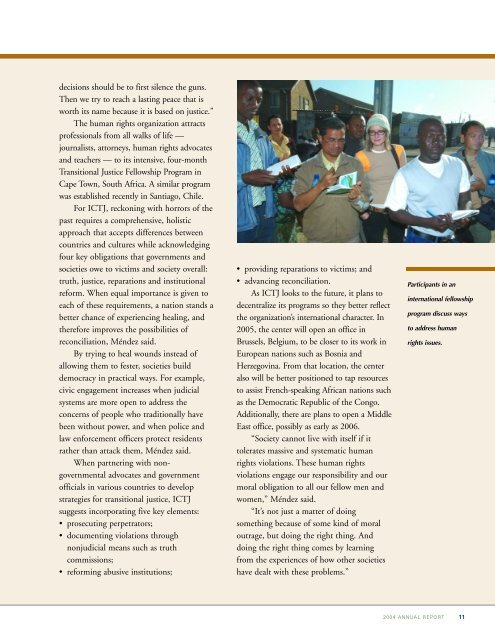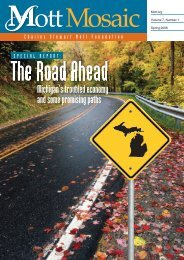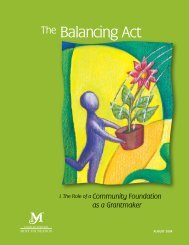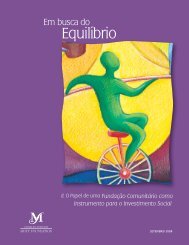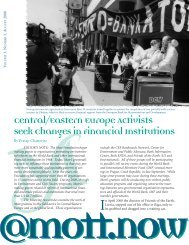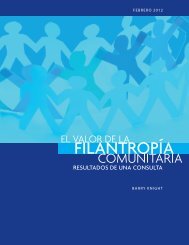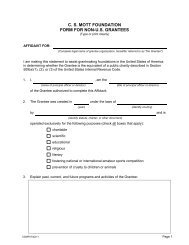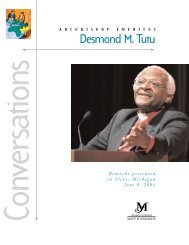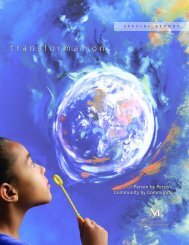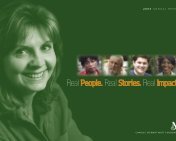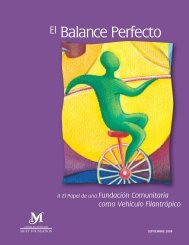Annual Report 2004 - Charles Stewart Mott Foundation
Annual Report 2004 - Charles Stewart Mott Foundation
Annual Report 2004 - Charles Stewart Mott Foundation
Create successful ePaper yourself
Turn your PDF publications into a flip-book with our unique Google optimized e-Paper software.
decisions should be to first silence the guns.<br />
Then we try to reach a lasting peace that is<br />
worth its name because it is based on justice.”<br />
The human rights organization attracts<br />
professionals from all walks of life —<br />
journalists, attorneys, human rights advocates<br />
and teachers — to its intensive, four-month<br />
Transitional Justice Fellowship Program in<br />
Cape Town, South Africa. A similar program<br />
was established recently in Santiago, Chile.<br />
For ICTJ, reckoning with horrors of the<br />
past requires a comprehensive, holistic<br />
approach that accepts differences between<br />
countries and cultures while acknowledging<br />
four key obligations that governments and<br />
societies owe to victims and society overall:<br />
truth, justice, reparations and institutional<br />
reform. When equal importance is given to<br />
each of these requirements, a nation stands a<br />
better chance of experiencing healing, and<br />
therefore improves the possibilities of<br />
reconciliation, Méndez said.<br />
By trying to heal wounds instead of<br />
allowing them to fester, societies build<br />
democracy in practical ways. For example,<br />
civic engagement increases when judicial<br />
systems are more open to address the<br />
concerns of people who traditionally have<br />
been without power, and when police and<br />
law enforcement officers protect residents<br />
rather than attack them, Méndez said.<br />
When partnering with nongovernmental<br />
advocates and government<br />
officials in various countries to develop<br />
strategies for transitional justice, ICTJ<br />
suggests incorporating five key elements:<br />
• prosecuting perpetrators;<br />
• documenting violations through<br />
nonjudicial means such as truth<br />
commissions;<br />
• reforming abusive institutions;<br />
• providing reparations to victims; and<br />
• advancing reconciliation.<br />
As ICTJ looks to the future, it plans to<br />
decentralize its programs so they better reflect<br />
the organization’s international character. In<br />
2005, the center will open an office in<br />
Brussels, Belgium, to be closer to its work in<br />
European nations such as Bosnia and<br />
Herzegovina. From that location, the center<br />
also will be better positioned to tap resources<br />
to assist French-speaking African nations such<br />
as the Democratic Republic of the Congo.<br />
Additionally, there are plans to open a Middle<br />
East office, possibly as early as 2006.<br />
“Society cannot live with itself if it<br />
tolerates massive and systematic human<br />
rights violations. These human rights<br />
violations engage our responsibility and our<br />
moral obligation to all our fellow men and<br />
women,” Méndez said.<br />
“It’s not just a matter of doing<br />
something because of some kind of moral<br />
outrage, but doing the right thing. And<br />
doing the right thing comes by learning<br />
from the experiences of how other societies<br />
have dealt with these problems.”<br />
Participants in an<br />
international fellowship<br />
program discuss ways<br />
to address human<br />
rights issues.<br />
<strong>2004</strong> ANNUAL REPORT<br />
11


